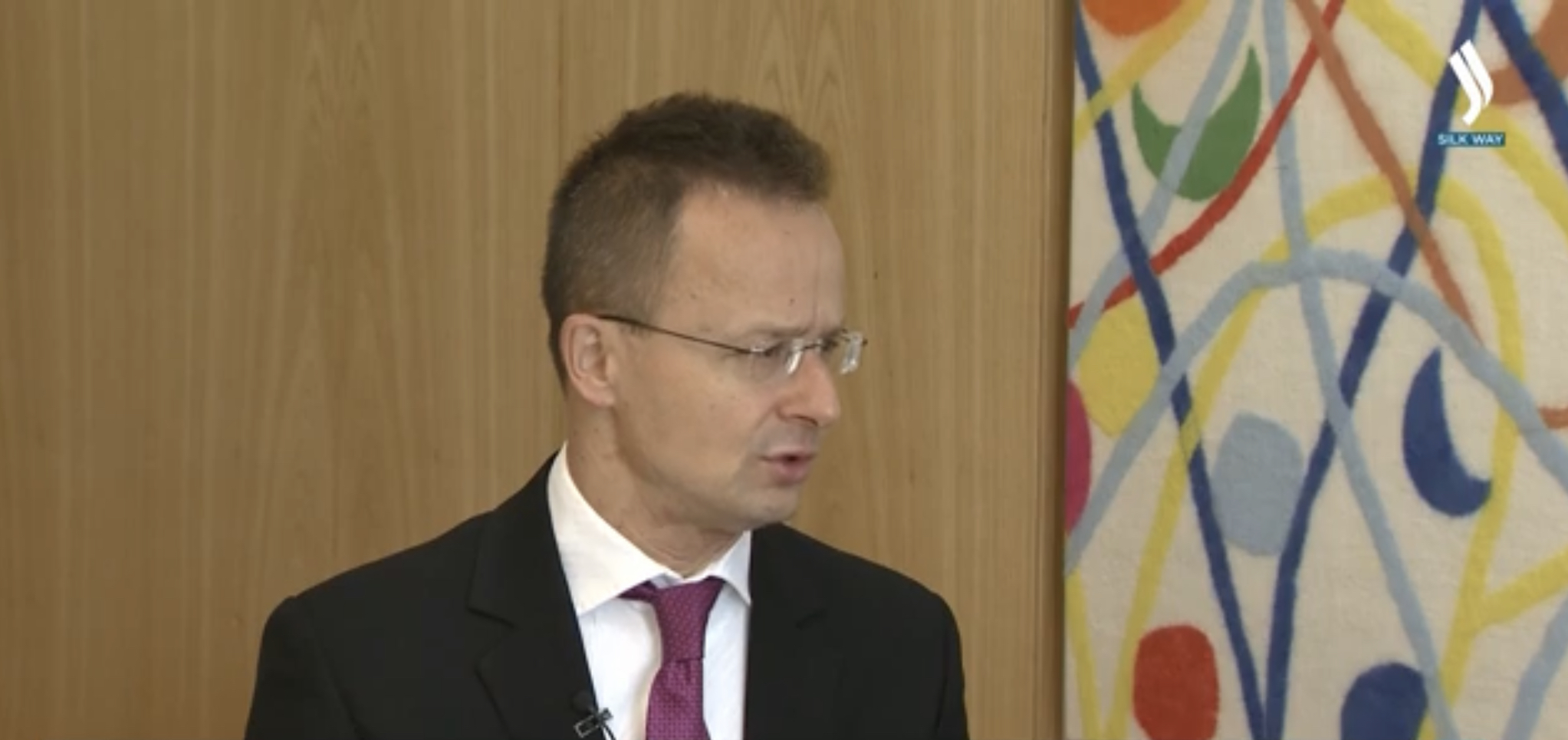ASTANA – Central Asia’s role of being a transit corridor for goods from China and broader Southeast Asia will increase, giving a basis for a strong economic partnership with the European Union (EU), said Minister of Foreign Affairs and Trade of Hungary Peter Szijjarto in a recent interview with Jibek Joly TV channel.

A video screen from the interview of Minister of Foreign Affairs and Trade of Hungary Peter Szijjarto with Jibek Joly TV channel.
Sharing his view on bilateral and multilateral cooperation between Hungary and Kazakhstan, as well as between the EU and Central Asia, Szijjarto said Hungary views Kazakhstan as a vital partner with expanding collaboration in the oil and gas industry.
What is at the heart of Kazakhstan-Hungary bilateral ties, and do you see these relations changing in the near future?
In our partnership with Kazakhstan, we can highlight three major pillars. First of all, Hungary is a country which has been using nuclear power for more than four decades now and we understand that nuclear power is a sustainable, cheap, safe way of generating energy. We also understand the big share of the uranium deposits all around the world is to be found in Kazakhstan. We also know the Kazakh government has a plan to step into the market of the nuclear industry by building the first nuclear facility in the country. There has been a long standing cooperation between the two countries in the field of education and training, and now we are extending it to the nuclear field as well. Since we have been using nuclear power for 40 years, we have a valid, established and well-structured training and education system. We do hope that at least part of the future Kazakh nuclear engineers and experts will be partly educated and trained in Hungary.
The second pillar is oil. We have been buying Kazakh oil in an increased way, taking advantage of your ownership in the port of Batumi from where the shipments can be launched. If you look at the figures this year, our import from Kazakhstan has increased a lot. During the first two months it has exceeded $100 million, which is basically exclusively oil.
The third pillar is related to the presence of the biggest Hungarian energy company MOL in Kazakhstan. MOL has been involved in the operation of the Fedorovsky block which is very significant from the perspective of the country’s future energy situation and according to the field development plan which has been submitted by MOL and approved recently, during this year, in the fourth quarter, exploitation of gas will be started. So on gas, on oil and nuclear, we can cooperate well and this creates the core of our cooperation.
Energy sector is critical to both countries. Do you see the collaboration increasing in this field, and can we assume that Kazakhstan might become Hungary’s alternative energy partner?
I would not say alternative, because we do not want to replace our current energy mix that we have, but we consider this partnership as a good source of diversification. For us, diversification in the field of energy supply is very important. We are absolutely satisfied with our energy cooperation with Russia. We consider both the oil and gas cooperation with Russia as a reliable one. But of course diversification must always be a strategic goal and, therefore, Kazakhstan can be a good solution for us.
Kazakhstan is part of the Central Asian region as well as the Eurasian Economic Union, which includes Armenia, Belarus, the Kyrgyz Republic and Russia. On the other hand, we have another neighboring country, China, which is becoming a major economic partner through the Belt and Road Initiative. In your opinion, how will all of this affect the EU and Hungary’s economic relations, particularly with Kazakhstan and the region?
We do consider Central Asia as a region of strategic importance. This is not an accident that we have joined the Organization of the Turkic States as an observer, because we do believe that this region of the world is emerging rapidly.
We are a strong supporter of the Eurasian idea – the idea of Eurasian cooperation. We would like to see Central Asia increasing its role when it comes to cooperation with Europe, including through the Belt and Road initiative.
I am proud that I was the first Foreign Minister in the European Union who signed the cooperation agreement with China on the implementation of the Belt and Road initiative eight years ago. We as a country located in the central part of Europe want to see East and West cooperating. We do believe in connectivity instead of blocks. And we think that the Belt and Road initiative is a good asset when it comes to connectivity in the future.
Globally speaking, external partnerships for Europe are vital. We see Central Asia as a region, cooperation with which will help Europe to get stronger on economic terms.
